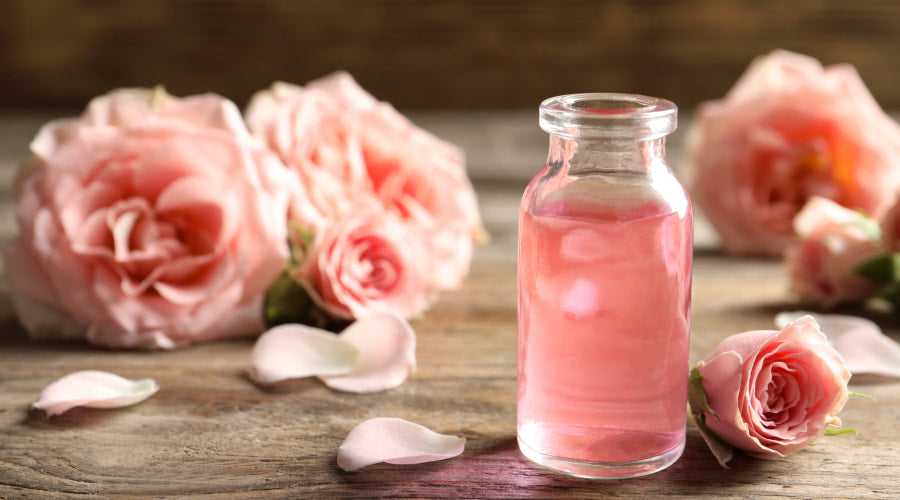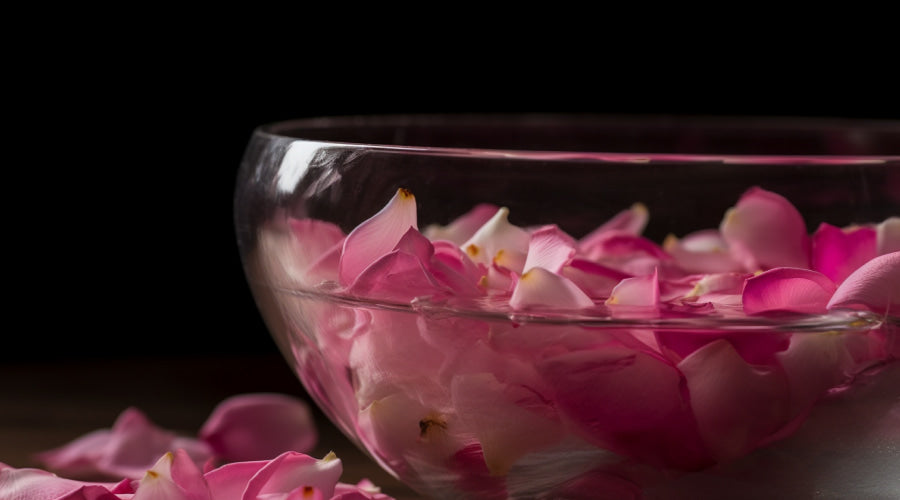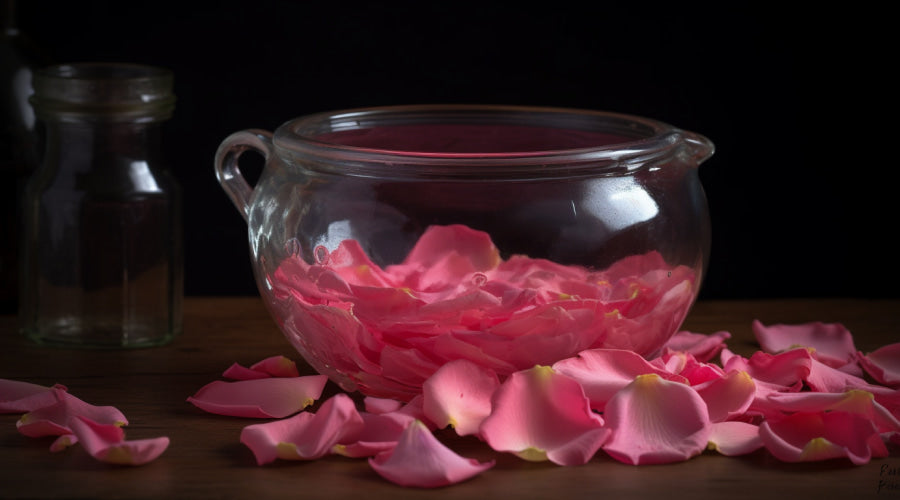Making Heavenly Rose Water at Home: Step-by-Step Tutorial
Welcome to the aromatic world of pleasure! Prepare yourself for an amazing adventure ahead. How to make rose water at home? Step by step, we will reveal the essence of nature's most elegant bloom. We will take you through a sensory adventure. It will make you immerse yourself in its attractive aroma and magical beauty. Get ready to improve your self-care regimen.
Rejuvenate your senses and enjoy the luxurious embrace of this timeless elixir. We will unravel the art of producing exquisite rose floral water without leaving home. Let the petals dance, and the aroma lingers. We'll dive right into this guide with detailed instructions to create your heavenly elixir. It will be a real testimony of your creativity and passion.
This article helps you make your own rose water.
Benefits of Rose Water

People have cherished the wide range of beneficial properties offered by rose essence for centuries. Here are some of the magical advantages of using rose distillate:
- Rose water has mild and hydrating characteristics. They can soothe and moisturize the skin. This makes it a great natural toner for all skin types. It is also necessary to maintain a healthy and radiant complexion. Rose petal water toner balances the skin's natural pH level and regulates excess sebum production. This makes it beneficial for oily and combination skin.
- Rejuvenating and anti-irritation attributes of rose essence can help reduce skin redness. They help fight free radicals and promote a youthful and radiant complexion. The most significant benefit of rose essence is that you can be making rose water at home.
- Due to its soothing aroma, rose floral water also provides relaxation and stress relief. When sprayed or added to bath rituals, it can help relieve stress and anxiety. It makes a sense of calm and rejuvenation.
- Rose water can nourish and moisturize hair. It reduces frizz, adds shine, and restores moisture balance.
- Aromatherapists use the aromatic essence of rose petal water to improve mood. It can create a harmonious atmosphere.
- This water can also be used to clean and disinfect minor cuts.
The various advantages of rose water make it a favorite ingredient in the beauty world. Rose petal water gives a timeless allure that can be enjoyed.
How to Make Rose Water at Home
Many people do not know that roses, in addition to charm, have healing properties. Often we buy flowers and do not even think that we have a source of vitamins in front of us. Each flower has its own advantages. We can make a beautiful bouquet out of them, but you can also use them for cosmetic purposes. You can even cook culinary masterpieces with roses. So when you see a beautiful bouquet of flowers, know that you have a real treasure in front of you.

One way to use roses is to make rose water. Discover the magical world of this water. Create it with your own hands! Immerse yourself in the beautiful process of the rose water recipe. You will discover the secrets of obtaining the pure essence of roses. Turn them into a fragrant elixir. It can improve your beauty and self-care rituals. In just a few simple steps, you will discover an exciting fragrance for yourself.
Step 1: Gather Newly-Picked Rose Petals
Start by collecting a large number of fresh rose petals. Ideally, choose organic roses. Make sure no pesticides or chemicals have been used. You can buy them from a trusted source. It is important to make the water quality.
Step 2: Wash the Petals and Prepare a Pot of Distilled Water
Carefully wash the rose blossoms under cool running water. Be careful not to damage the petals during this process. Take a clean pan and fill it with deionized water. It is better to use distilled water because it does not contain impurities.
Step 3: Simmer the Blend on a Low Flame
Place the washed rose petals in a pot of distilled water. Place the pan on the stove over low heat. Bring the water to a slow boil. Keep an eye on the pan so the water does not reach boiling. Excessive heat can impair the aroma and therapeutic properties of homemade rose water.
Step 4: Place a Lid on Top and Allow for Infusion
Cover the pan with a lid as soon as the water starts to boil. This helps to trap aromatic steam and essential oils. Let the rose petals infuse their essence into the liquid. Let the mixture boil for about half an hour.
Step 5: Filter Out the Fluid
Take the pan off the heat and allow it to cool down a bit. Place a fine-mesh strainer over a clean container or bowl. Carefully pour the liquid through a sieve. Make sure that only fluid passes through it. Thanks to this, you will get pure, fragrant rose distillate.
Step 6: Store and Enjoy
Transfer the strained rose petal water to a clean, airtight bottle or container. Store it in a cool, dark place. Your self-made water from rose is now ready to use. Enjoy the luxurious benefits of the rose water recipe!
Before using rose essence on your skin, do a patch test to ensure you don't have any allergic reactions.
How to Use Rose Water at Home
There are many ways to use rose petals. And also there are a few ways to incorporate the magical advantages of rose water into your everyday schedule, from skincare to aromatherapy. This all-in-one elixir is critical to improving your well-being and enjoying moments of pure bliss. Making rose water at home will help you.

We will delve into the many beautiful uses of rose water. Get ready to embark on a journey of sensual pleasure where the essence of roses fills the air. Let's explore the fascinating world of rose water together. Discover the endless possibilities that await you!
Health and Beauty
Make your own rose water for both health and charm purposes. It can serve a multitude of uses.
1. Rose Water for Face
Options may include:
- Tonic for the face. After cleansing, apply rose floral water to your facial area using a cotton pad. This helps to balance the pH. It also tightens the pores and moisturizes the skin.
- Make-up remover. Carefully remove the rest of the make-up with cotton pads soaked in rose water. This will act as a natural and soothing agent.
- Face mist. Pour water in a misting bottle. Apply on your face throughout the day. This will help to get a refreshing and moisturizing effect.
2. Making Sugar Scrub
Mix rose water with sugar to make a gentle exfoliating scrub. Apply to damp skin with massaging movements. You will experience the best effect from making rose water at home. Thus, it will contain only natural components.
3. Rinse for the Hair
After shampooing your hair, consider using diluted rose floral water as a rinse. This can provide your hair with a lustrous sheen and a delicate fragrance.
4. Bath Additive
Add rose water to the bath. So you can enjoy a luxurious and fragrant bathing experience.
Cooking with Rose Water
Homemade rose water can also be used for culinary purposes. It will add an exciting note of taste to your dishes.
1. Water Iced Tea
Brew your favorite tea, and let it cool. Then add a little rose water for a delicate floral touch. Serve over ice for a refreshing summer drink.
2. Making Cocktails
Elevate your cocktails by adding a few drops of rose floral water. It can add a delightful floral note to drinks like martinis, mojitos, or mocktails.
3. Desserts and Sweets
Improve the taste of baked goods such as cookies, cakes and ice cream. Add the rose water recipe to your dishes.
4. Salad Dressing
Create a unique dressing by combining rose water with olive oil. Combine it with lemon juice and honey for a refreshing salad.
Feel free to explore these suggestions and unleash your creativity.
Storing the Rose Water

Proper storage of rose water as proper storage of roses is essential. Thanks to appropriate storage, it will be fresh for a long time and bring many benefits. To properly store rose water, follow these steps:
- Choose an airtight container. Make your own rose water. Transfer it to a clean, airtight bottle or container. Choose dark-colored glass bottles to protect the water from exposure to light.
- Keep cool. Store the container in a cool, dark place. You can store water in the pantry or refrigerator. The cool temperature helps keep the rose water fresh.
- Avoid pollutants. Before pouring rose water into it, ensure the container is clean and dry. This prevents the growth of bacteria or mold.
- Label and date. It is helpful to mark the date of preparation on the container. That way, you can keep track of its freshness.
By following these storage guidelines, you can extend the shelf life of your homemade rose distillate and continue to enjoy its incredible benefits for a long time.
A Few Words from Rosaholics
At Rosaholics, our love for roses goes far beyond their outward beauty. We believe in using the therapeutic properties of roses. It improves life in many ways. We sincerely invite you to embark on an aromatic journey with Rosaholics. Create your rose water recipe using only the finest roses.
Rose water made by you can be a fun and rewarding experience. The advantages of its use are numerous. It not only has a wonderful aroma but also has numerous therapeutic properties. They can support your overall well-being. Let your imagination run free making rose water at home. Create a recipe uniquely tailored to your preferences.
At Rosaholics, we value the magic of roses and the transformative essence they carry. We encourage you to immerse yourself in the world of roses. Experience the eternal elegance and healing characteristics of these flowers. When ordering from us, you can be sure of the gentle appeal of our roses. So why wait? Join us. Order flowers from Rosaholics and create your masterpieces.
FAQ
The shelf life of homemade rose water is typically around 6 to 12 months when stored properly.
Drinking homemade rose water is valued for its potential for easy relaxation. It can also aid digestion and relieve mild gastrointestinal discomfort.
Rose water is not known to have significant skin-lightening effects. Benefits for the skin include hydration, soothing, and balancing the pH levels.
This may be due to the presence of oxidized rose petals. It can also be the result of exposure to excessive temperature.
Read Also:
Not seen your shipping location? We deliver US Nationwide, visit our Shop All collection to discover the perfect bouquet that best fit your occasion.

Copy and paste this code on your next purchase at Rosaholics
Never miss a great Rosaholics promotion, and so many more!



















